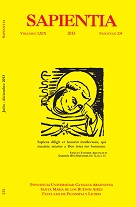Por favor, use este identificador para citar o enlazar este ítem:
https://repositorio.uca.edu.ar/handle/123456789/5014| Campo DC | Valor | Lengua/Idioma |
|---|---|---|
| dc.contributor.author | Echeverría, Eduardo J. | es |
| dc.date.accessioned | 2019-06-01T19:03:20Z | - |
| dc.date.available | 2019-06-01T19:03:20Z | - |
| dc.date.issued | 2013 | - |
| dc.identifier.citation | Echeverría, E. J. The views of Karl Popper and Joseph Ratzinger/Benedict XVI on a theory of rationality [en línea]. Sapientia. 2013, 69 (234). Disponible en: https://repositorio.uca.edu.ar/handle/123456789/5014 | es |
| dc.identifier.issn | 0036-4703 | - |
| dc.identifier.uri | https://repositorio.uca.edu.ar/handle/123456789/5014 | - |
| dc.description.abstract | Abstract: typical of some contemporary theories of rationality is the pithily formulated idea stated almost 20 years ago by Gillian Rose (1947-1995) in her autobiography: «Reason, the critical criterion, is forever without ground». One important way of understanding this statement is found in the early writings of Karl R. Popper (1902-1994). This statement expresses the conviction at the root of Popper’s theory of rationality. This article begins with a brief presentation and analysis of Popper’s theory of rationality as it bears upon the question of violence. Afterwards, I turn to consider Ratzinger/Benedict XVI’s theory of rationality—as a response to Popper’s theory of rationality where critical reason is forever without ground. For Popper reason has its origin in the irrational, being as such, then, without grounds. Pace Popper, according to Ratzinger, reason has its origin in the Logos. In this connection, I lay out Ratzinger’s appeal to the ecumenical Christian philosophy of the Logos as the grounds of human reason. Wrapping up my presentation of Benedict’s view, I argue that he overcomes the dilemma of rationalism and irrationalism, especially in connection with the question of violence | es |
| dc.format | application/pdf | es |
| dc.language.iso | eng | es |
| dc.publisher | Pontificia Universidad Católica Argentina. Facultad de Filosofía y Letras | es |
| dc.rights | Acceso Abierto | es |
| dc.rights.uri | https://creativecommons.org/licenses/by-nc-sa/4.0/ | es |
| dc.source | Sapientia. 2013, 69 (234) | es |
| dc.subject | RACIONALISMO | es |
| dc.subject | LOGOS | es |
| dc.subject | Ratzinger, Joseph, Card., 1927- | es |
| dc.subject | Benedicto XVI, Papa | es |
| dc.subject | Popper, Karl Raimund, 1902-1994 | es |
| dc.title | The views of Karl Popper and Joseph Ratzinger/Benedict XVI on a theory of rationality | es |
| dc.type | Artículo | es |
| uca.path | Sapientia|2013 Vol LXIX nº 234 | es |
| uca.disciplina | FILOSOFIA | es |
| uca.filename | /home/data-uca-generic/folder_generic/Sapientia234/views-popper-ratzinger-rationality/metadata.xml | es |
| uca.issnrd | 1 | es |
| uca.affiliation | Fil: Echeverría, Eduardo J. Sacred Heart Major Seminary; Estados Unidos | es |
| uca.version | publishedVersion | es |
| item.languageiso639-1 | en | - |
| item.fulltext | With Fulltext | - |
| item.grantfulltext | open | - |
| Aparece en las colecciones: | SAP - 2013 Vol LXIX nro. 234 | |
Ficheros en este ítem:
| Fichero | Descripción | Tamaño | Formato | |
|---|---|---|---|---|
| views-popper-ratzinger-rationality.pdf | 325,68 kB | Adobe PDF |  Visualizar/Abrir |
Visualizaciones de página(s)
193
comprobado en 30-abr-2024
Descarga(s)
355
comprobado en 30-abr-2024
Google ScholarTM
Ver en Google Scholar
Este ítem está sujeto a una Licencia Creative Commons

